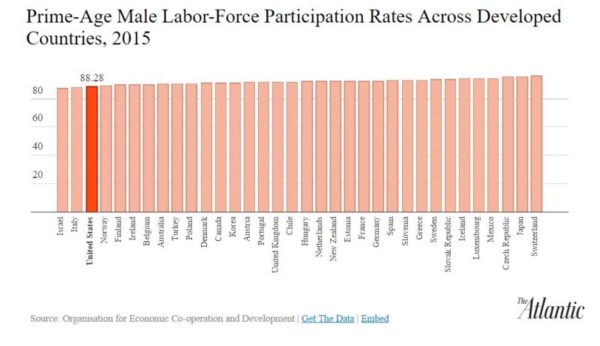Ricochet is the best place on the internet to discuss the issues of the day, either through commenting on posts or writing your own for our active and dynamic community in a fully moderated environment. In addition, the Ricochet Audio Network offers over 50 original podcasts with new episodes released every day.
 About Those Prime-age Males Who Aren’t Working or Looking for Work
About Those Prime-age Males Who Aren’t Working or Looking for Work

OK, here is the good news about the above chart: If other countries can have higher prime-age male labor force participation — I assume there are video games in those countries, too — so can we? Here is Obama economist Jason Furman:
This suggests that there is no economic reason that the United States cannot address inequality and increase employment while enjoying even higher levels of technology and productivity than seen today. What matters is how labor-market institutions—such as job-training programs, relocation assistance, licensing regimes, and so on—cope with these changes, support the creation of new jobs, and successfully match workers to them. An overhaul of the policies that shape labor markets—such as unemployment insurance, education and training, the tax system, collective bargaining and wage protections, and so on—could greatly improve the functioning of the U.S. labor market, regardless of whether automation and AI materialize as expected.
I am especially interested in ideas that remove barriers to work and make work pay better for low-income Americans. Furman’s analysis comes in an Atlantic piece he writes about artificial intelligence, based on a recent White House CEA report. It is a technology with great promise but comes at time when there some are adverse labor force trends, like that participation number. Again, Furman, outlining the potential labor market challenge:
Published in EconomicsEighty-three percent of jobs making less than $20 per hour are projected to come under pressure from automation, as compared to 31 percent of jobs making between $20 and $40 per hour, and just 4 percent of jobs making above $40 per hour, as the graph below illustrates. Of course, advanced economies have seen vast amounts of innovation in the last three centuries without rendering human labor obsolete. Most of the types of jobs that existed in the 1700s do not exist today, but new types of jobs that no one could have imagined then have taken their place—all because of technological advances. A different trajectory is unlikely to emerge this time around because even though AI has the potential to replace certain human tasks, it will likely also create entirely new fields of jobs. So 83 percent of the jobs making less than $20 per hour will not simply disappear. But it does mean that during a transition period low-wage jobs could face substantial downward pressure on their wages to remain viable in the face of competition from technological substitutes.




A Democrat said this? Wow. Hell must be freezing over.
The single barrier to work, and higher pay, is the value of the work. What value does the work bring? This is what entrepreneurs do, find new value and news ways to deliver value.
Policy cannot create value.
I would like to see what portion of each population is receiving disability benefits from the government, a structured settlement, or an insurance company. I would also like to see how disability benefits in those nations has evolved over time compared to labor force participation. Having personal, anecdotal knowledge of a quadriplegic prime-age male who worked a full day every day, I fear that we are killing many of our young men with kindness.
These people assume that the central government can mange these changes by pushing resources in one direction or another and that a free market can’t. The evidence is that the government can’t, indeed there is no evidence anywhere that it can. And all the evidence is that free markets under clear law can. The difference is that there is no real pay off for the political bureaucratic class in freedom. On the other hand free markets make one mistake after another and while markets corrects all of them, those mistake open up opportunities for rent seeking demagoguery. The only defense is the founding ideology and that requires understanding. This is why it has been so important to the left that our schools not be educational and that religion and the notion that ideas, principles, values matter must be removed from the public square.